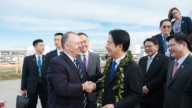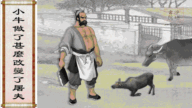【新唐人2011年12月20日訊】統治朝鮮17年的獨裁者金正日12月17號病逝,引發全球密切關注,尤其是他的第三個兒子、今年29歲的金正恩能否順利接班。外界分析,「後金正日時代」,對於朝鮮半島的無核化與和平進程,既存在契機又充滿風險,同時也給朝鮮社會的變革帶來了機會。
朝鮮官方媒體19號報導,朝鮮國防委員長金正日17號在行駛的列車上,死於急性心肌梗塞,終年69歲。在此之前,金正日15號視察了朝鮮首家中國式大型超市「光復地區商業中心」。
朝鮮勞動黨要求全民「忠於金正恩的領導」。《韓聯社》報導說,金正恩將像他的父親金正日當年接班時一樣,服喪三年,並在此期間謀求鞏固權力。
金正恩去年被推舉為僅次於金正日的軍方二把手。金正日的妹妹和妹夫張成澤也已被委任軍政要職,作為金正恩的接班監護人,形成金家世襲的統治集團。
金正恩1984年1月出生,曾在瑞士首都留學,學習英文、德文和法文。金正日去年8月秘密訪問中國時,在長春向中共總書記胡錦濤引見了金正恩,有媒體形容為「託孤」。
金正日之死是否引發朝鮮權力鬥爭,外界看法各不相同。遼寧社科院朝韓研究中心主任呂超認為,朝鮮很可能會平穩接班,如果權力不能平穩過渡,將會對東北亞局勢形成極大的衝擊。
韓國《朝鮮日報》報導,金正日去世後,朝鮮安全人員控制了主要街道,集市也被關閉,並封鎖了中朝邊境。中共也向軍隊下達了「一級備戰命令」,以防不測。
《中國事務》主編伍凡指出,中共與朝鮮「唇亡齒寒」。
伍凡:「金正日死了那當然是個大好的消息啦,對全世界獨裁專制的國家是一個噩耗。現在緊接著就是,中共要對朝鮮半島這一個部分它會加強軍事力量的控制,生怕因為金正日死了,那麼金正日這個系統全部垮臺,引起社會動亂,再一個,不要讓朝鮮的難民跑到中國來。」
美國總統歐巴馬與韓國總統李明博通了電話,重申華盛頓對朝鮮半島穩定的承諾。韓國軍隊已進入緊急戒備狀態。日本也成立了有關朝鮮問題的危機處理小組。
美國CNN表示,金正日去世後,朝鮮的領導層更換,對於解決朝鮮半島核問題、改善美朝關係可能是一個機會,但也有相當的風險。目前,有關各方都在緊張的觀望局勢發展,避免發出錯誤的信號。
《朝鮮日報》報導,美朝雙方16號在北京初步達成了協議,朝鮮表示願意接受韓美要求的「先採取無核化措施」,也就是中斷鈾濃縮計劃,換取每月2萬噸的糧食援助。
美朝並決定22號在北京舉行第三次美朝會談。如果會談取得成果,六方會談有望在明年2、3月左右重啟。但是,金正日突然去世,美國官員表示,這些進程很有可能將被推遲。
日本《讀賣新聞》報導,金正恩去年11月曾表示,「糧食比子彈重要」,要在3年內讓朝鮮人民吃上白米飯肉湯。香港《動向》雜誌主編張偉國指出,金正日的死給朝鮮帶來了變革的契機。
張偉國:「像中國、像朝鮮,如果它的政治制度沒有辦法推進這種社會變革的時候,領導人的去世就為這個變革帶來一些機會。所以,從這個角度來看,金正日的去世,為朝鮮新的變局帶來機會。」
外界分析,中共擔心金正日之死導致朝鮮政權變局甚至垮臺,倒向韓國和美國,最終由韓國主導實現朝鮮半島的統一。「後金正日時代」,朝鮮的政治、經濟等各方面的走向,都將對中國社會的轉型產生重要影響。
新唐人記者常春、李元翰、蕭宇採訪報導。
Kim Jong Il’s Death—Opportunities for Korean Peninsula
North Korea’s 17-year dictator, Kim Jong Il,
died on December 17, triggering global attention.
Focus is on his third son, 29-year-old Kim Jong-un
and his succession to political power.
Analysts say in the post-Kim Jong Il era, both chances
and risks coexist in bringing denuclearization, peace and social change to the Korean Peninsula.
On December 19, North Korea’s official media reported
the death of leader Kim Jong Il at the age of 69.
An acute heart attack killed Jong Il on a train
on December 17.
Two days earlier, Kim had inspected the country’s
first Chinese-style large supermarket in Pyongyang.
The Korean Workers’ Party is demanding all North Koreans
to be “loyal to Kim Jong-un’s leadership."
Yonhap News reported, Kim Jong-un will mourn for three years,
as his father did when he took over.
The period will prepare Kim Jong-un to consolidate his power.
Kim Jong-un was elected the military’s second-in-command
in 2010, under Kim Jong Il.
Jong Il’s sister and brother-in-law were also given key
military and political positions.
Both will serve as guardians assisting Jong-un’s succession,
forming the Kim-family hereditary rule.
Born in 1984, Kim Jong-un studied English, German
and French in Switzerland.
In August 2010, Kim Jong Il visited China secretly,
introducing Jong-un to President Hu Jintao.
Media said Kim’s visit was “entrusting his son to the care
of the CCP (Chinese Communist Party)”.
Will Kim Jong-Il’s death provoke political power struggle
in North Korea? Outsider comments vary.
Research center director at Liaoning Academy of
Social Sciences, Lu Chao, believes succession will likely be smooth.
If it fails, the aftermath may hit Northeast Asia hard.
According to South Korea’s The Chosun Ilbo, North Korean
security officers started controlling the main streets.
After Jong Il’s death, markets were closed and the
North Korea-China border sealed off.
The Chinese Communist Party ordered its army to be in
“first-degree combat readiness”, in case of an emergency.
China Affairs magazine Chief Editor, Wu Fan, points out,
China—North Korea relations are such that
“Teeth are exposed to the cold when the lip is lost.”
Wu Fan: " Kim Jong Il’s death is certainly great news.
But it’s sad news to the world’s dictatorship regimes.
Now, following this event will be the CCP’s further
military control over the Korean peninsula.
The CCP fears Kim Jong Il’s death will trigger his regime’s
collapse and social unrest.
The CCP has another purpose —to prevent North Korea’s
Refugees from entering China. “
U.S. President Barack Obama spoke to his South Korean
counterpart Lee Myung-bak by telephone.
Obama reiterated Washington’s commitment to the stability
of the Korean peninsula.
South Korean troops have been put on emergency alert.
Japan also set up a crisis management team on North Korea.
CNN says Kim Jong Il’s death and the change in leadership
may better US-N.Korea relations and resolve nuclear issues.
But there are also considerable risks.
At present, all parties concerned are observing,
avoiding sending the wrong signal.
The Chosun Ilbo reported, U.S. and North Korea reached
an initial agreement in Beijing on December 16.
North Korea was willing to accept “denuclearization first”,
as demanded by South Korea and the U.S..
North Korea is asked to suspend its uranium enrichment
program in exchange for a 20,000-ton monthly food aid.
Beijing holds the third US-North Korea talks on December 22.
If successful, the six-party talks are expected to resume
around February or March 2012.
However, with Kim Jong Il’s sudden death, U.S. officials say
the process will likely be postponed.
Japanese media The Daily Yomiuri, says in November 2010,
Kim Jong-un stated, “Food is more important than bullets".
He claims in three years, white rice and broth will become
a reality for the North Korean people.
Hong Kong’s Trends magazine Chief Editor, Zhang Weiguo,
says Kim Jong-il’s death brings North Korea a chance for social change.
Zhang Weiguo: “Like in China or in North Korea,
when its political system has no way to advance social change,
a specific leader’s death could create some opportunities.
From this perspective, Kim Jong Il’s death brings opportunities
for change in North Korea. “
Outside analysts say the CCP fears Kim Jong Il’s death will
cause the North Korean regime to change or even collapse.
If North Korea sways towards South Korea and the U.S.,
the Korean peninsula may realize ethnic unity.
In the Post-Kim Jong Il era, North Korea’s political, economic
and other trends may greatly influence Chinese society.
NTD reporters Chan Chun, Li Yuanhan and Xiao Yu





























